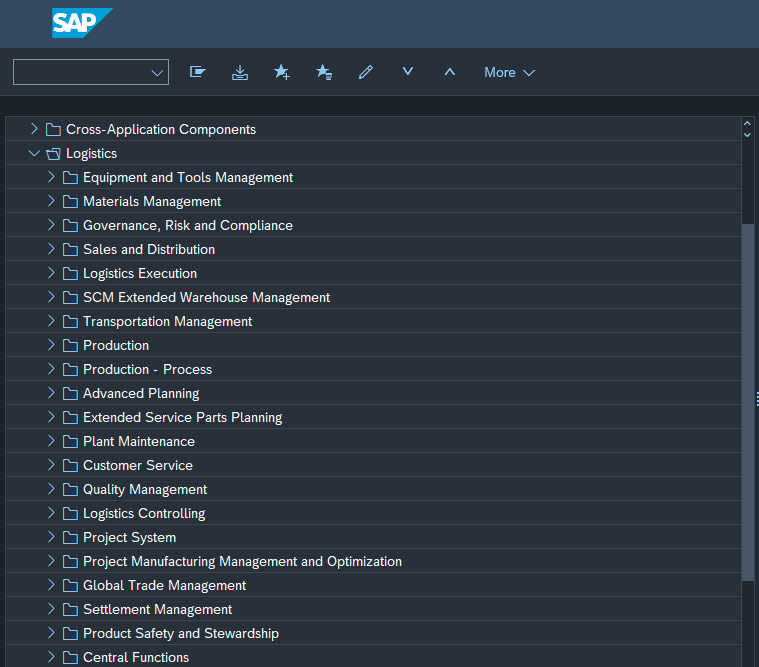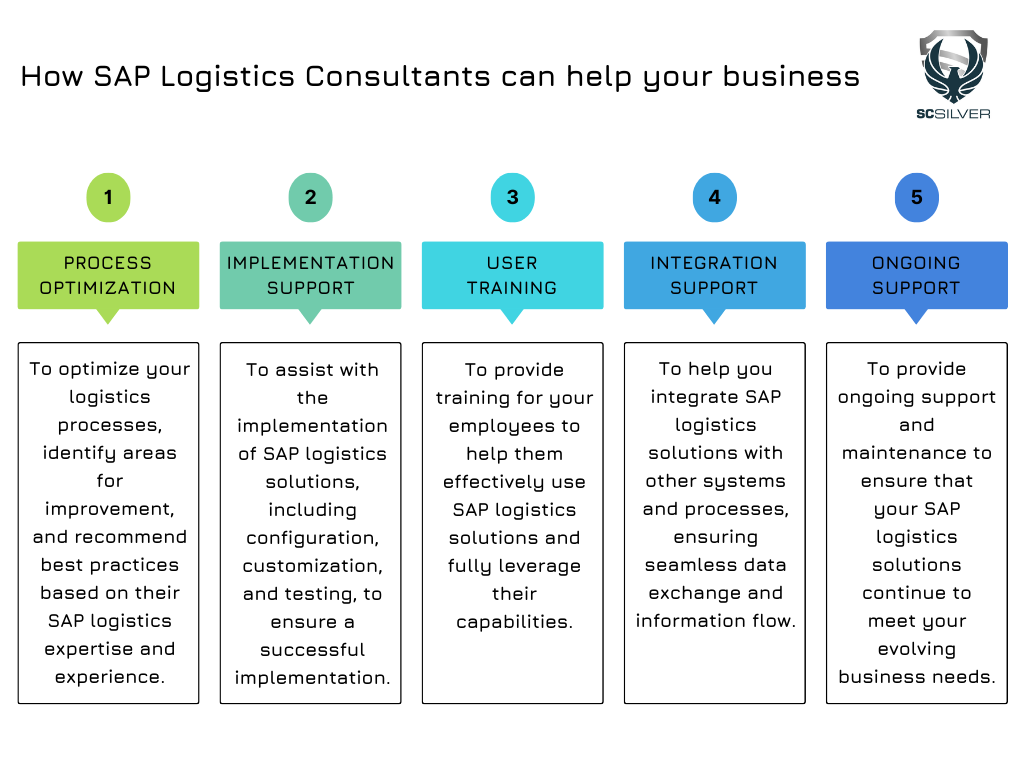
Introduction – the Importance of Logistics Management
Effective logistics management is essential for the success of any business, facilitating the timely and efficient movement of goods. Logistics management encompasses various activities, including procurement, warehousing, transportation, distribution, and delivery. The objective of logistics management is to optimize the flow of goods while minimizing costs and maximizing efficiency.
While logistics deals with the physical movement and management of goods, the supply chain includes a wider range of activities such as sourcing, procurement, production, and distribution. Logistics is a vital component of the supply chain, and effective logistics management is critical for optimizing the supply chain’s performance.
This SC Silver article explores the concepts of SAP logistics business processes, the role of logistics in supply chain optimization, and how the use of an Enterprise Resource Planning (ERP) system can bring significant benefits to logistics operations. It also highlights the significant benefits that can be achieved by using the SAP ERP system for logistics operations, the components included in SAP ERP for logistics and the complementary SAP software solutions that support logistics processes. In addition, it explains the enhancements and changes in the latest version of SAP ERP, SAP S/4HANA compared to the previous version, ECC.
With these insights, readers will gain a better understanding of how engaging the services of a skilled SAP logistics consultant such as SC Silver allows you to utilize our proficiency and knowledge to upgrade your logistics functions, curtail expenses, and elevate your professional achievements.
The Value of Effective Logistics Management in Optimizing the Supply Chain
Business processes in logistics are the series of tasks and activities involved in managing the movement of goods and products from the manufacturer to the end customer. These processes include procurement, storage, transportation, distribution, and delivery. For businesses to be successful, it is vital that these processes are managed effectively to ensure the timely and efficient movement of goods, which ultimately affects customer satisfaction and overall profitability.
To comprehensively address the movement of goods, it’s imperative to take into account both logistics and supply chain management. Although logistics and supply chain are related terms, they refer to different aspects of the movement of goods.
Supply chain management includes all activities involved in the production and delivery of a product, starting from the procurement of raw materials to the delivery of the finished product to the end customer. In addition to logistics, it encompasses several business functions such as production, marketing, sales and customer service.
Logistics, on the other hand, is a subset of supply chain management that focuses specifically on the movement and storage of goods within the supply chain. It involves the coordination of transportation and storage activities such as shipping, trucking, warehousing, and inventory management. Effective logistics management is essential for businesses to optimize their supply chain and achieve operational efficiency through supply chain solutions.

Benefits of Using an Enterprise Resource Planning (ERP) System for Logistics
An Enterprise Resource Planning (ERP) system is a software solution that can help logistics operations to optimize performance and improve business results. Using SAP as your ERP system can bring many benefits to a logistics operation.
Firstly, by integrating all the key functions into a single unified system, SAP logistics enhance efficiency and accuracy by facilitating the sharing and updating of information across different departments. This eliminates manual data entry and reduces the risk of errors, saving time and improving decision-making.
Secondly, SAP provides real-time visibility into the entire logistics process, providing up-to-date information on shipments, inventory levels, and delivery schedules. This enables managers to optimize resources and improve customer satisfaction by ensuring timely and accurate deliveries. Real-time monitoring and tracking capabilities help identify potential issues and take corrective action before they become major problems.
In addition, SAP provides a range of tools and capabilities for automating key logistics processes, such as transportation planning, warehouse management, and supply chain collaboration. Automating these processes reduces the time and effort required to complete them, freeing up staff to focus on more strategic tasks. Market leaders complete their year-end closing 26 percent faster than other similar companies, with a cost reduction of up to 61 percent (benchmark by SAP Value Engineering).
Furthermore, SAP is a well-established and reliable solution with a proven track record of success in a wide range of industries. This makes it a smart choice for businesses looking to streamline their logistics operations, reduce costs, improve customer satisfaction, and gain a competitive advantage in their marketplace.
SAP Logistics Components and Software Overview
-
SAP for Logistics Components included in SAP ERP
The SAP ERP core (both ECC and S/4 HANA) consists of several key components, previously referred to as modules, that support the management of SAP logistics operations:
- Materials Management (MM): This component handles the procurement and inventory management of materials. It includes functions for purchasing, inventory management, material valuation, and supplier evaluation.
- Sales and Distribution (SD): This component deals with the sales process, from the creation of a customer order to the delivery of the product to the customer. It includes functions for sales order processing, delivery processing, invoicing and credit management.
- Production Planning (PP): This component helps to plan and control the production process. It includes functions for demand management, production scheduling, capacity planning, and material requirements planning.
- Plant Maintenance (PM): This component manages the maintenance of equipment and assets in the plant. It includes functions for maintenance planning, preventive maintenance, corrective maintenance, and refurbishment.
- Quality Management (QM): This component deals with the quality control and inspection of products. It includes functions for quality planning, quality inspection, and quality control.
- Warehouse Management (WM): This component manages the physical movement and storage of goods within the warehouse. It includes functions for goods receipt and issue, inventory management, and stock transfer.
- Project System (PS): This component manages the planning, execution, and monitoring of projects. It includes functions for project planning, project execution, and project monitoring.
SAP is categorizing logistics components as demonstrated below:

Each of these components works together to provide a comprehensive and integrated solution for managing SAP logistics operations. The components are designed to help organizations in streamlining optimize their logistics procedures, boosting operational effectiveness, and elevating their overall organizational success.
-
Extra SAP Software for Logistics
In addition to the SAP core logistics components, SAP offers several other software solutions that support logistics processes. Some of these solutions are:
- SAP Supply Chain Management (SAP SCM): This software provides a comprehensive suite of tools for end-to-end supply chain management, from demand planning to delivery. It includes capabilities for demand and supply planning, transportation management, inventory optimization, and supply chain collaboration.
- SAP Logistics Execution (SAP LE): This software provides a range of logistics execution capabilities, including delivery processing, transportation planning and management, and warehouse management.
- SAP Event Management (SAP EM): This software supports for event-driven supply chain management, including real-time monitoring of supply chain events and proactive response to potential disruptions.
- SAP Global Track and Trace (SAP GTT): This software provides a solution for real-time visibility and monitoring of shipments and deliveries, including end-to-end tracking, delivery exception management, and supply chain event management.
- Transportation Management (TM): This component manages the transportation of goods, including carrier selection, shipment planning, and freight billing.
- Extended Warehouse Management (EWM): This component provides advanced warehouse management capabilities, including real-time inventory visibility, automated warehouse processes, and improved supply chain collaboration.
- Supply Chain Planning (SCP): This component provides a comprehensive suite of tools for demand planning, supply network planning, and response and supply planning.
These solutions complement the components within the SAP ERP Business Suite, providing organizations with a comprehensive set of tools to manage logistics, increase operational effectiveness and optimize overall business productivity.
-
Improvements and changes in S/4 Hana
SAP S/4HANA is the latest version of SAP’s enterprise resource planning (ERP) software and offers several improvements and advantages for SAP logistics processes compared to the previous ECC version:
- Real-time processing: S/4HANA provides real-time processing and analysis of logistics data, enabling faster decision making and improved operational efficiency.
- Simplified user experience: S/4HANA includes a simplified user interface and improved navigation, making it easier for users to access and manage logistics information.
- Improved analytics: S/4HANA provides advanced analytics capabilities, including embedded business intelligence, predictive analytics, and real-time data visualizations, enabling organizations to make informed decisions based on accurate and timely information.
- Increased scalability: Designed for large and complex logistics operations, S/4HANA offers increased scalability and the ability to manage large volumes of data and transactions.
- Enhanced collaboration: S/4HANA includes tools for enhanced collaboration and communication between different departments and stakeholders, including supply chain partners, improving overall supply chain performance.
- Cloud deployment: S/4HANA offers a cloud deployment option, allowing organizations to access logistics information and capabilities from anywhere, at any time, and on any device.
Overall, SAP S/4HANA provides a more modern and integrated solution for logistics processes compared to the previous ECC version, helping organizations to improve operational efficiency, reduce costs, and enhance overall business performance.
How can a specialized SAP logistics consultant help your business?
By working with a specialized SAP logistics consultant like SC Silver you can leverage our expertise and experience to enhance your logistics operations, reduce costs and elevate overall business accomplishments.

Conclusion – Optimizing Logistics Operations with SAP ERP
Effective logistics management is essential for businesses to achieve supply chain efficiency. SAP ERP can bring significant business benefits to logistics operations. By integrating all the key functions of a business into a single, unified system, SAP helps to improve efficiency, accuracy, and real-time visibility into the entire logistics process.
Additionally, SAP offers a range of tools and capabilities for automating key logistics processes, reducing the time and effort required to complete them, and improving overall business performance. The SAP ERP core components support logistics management, while other SAP software solutions like Transportation Management and Extended Warehouse Management cater to logistics needs.
By utilizing SAP for logistics optimization, companies can reduce costs, improve customer satisfaction, and achieve a competitive advantage in their industry.
At SC Silver, we offer expert SAP support and SAP services to help businesses in successfully implementing SAP logistics solutions. Consult with our SAP consultants to transform your business TODAY.






